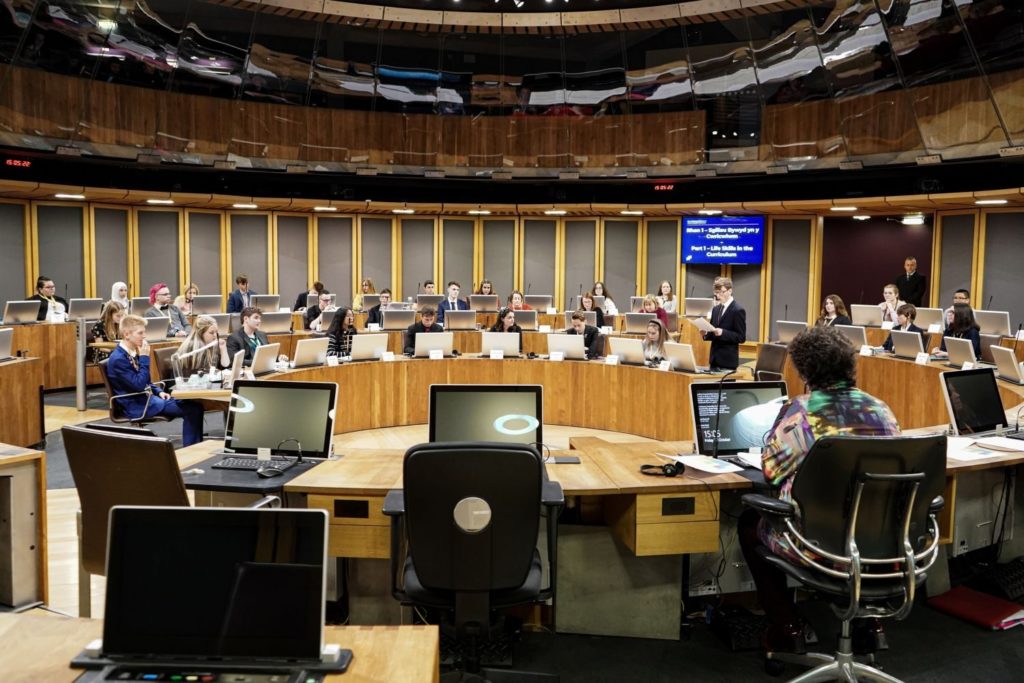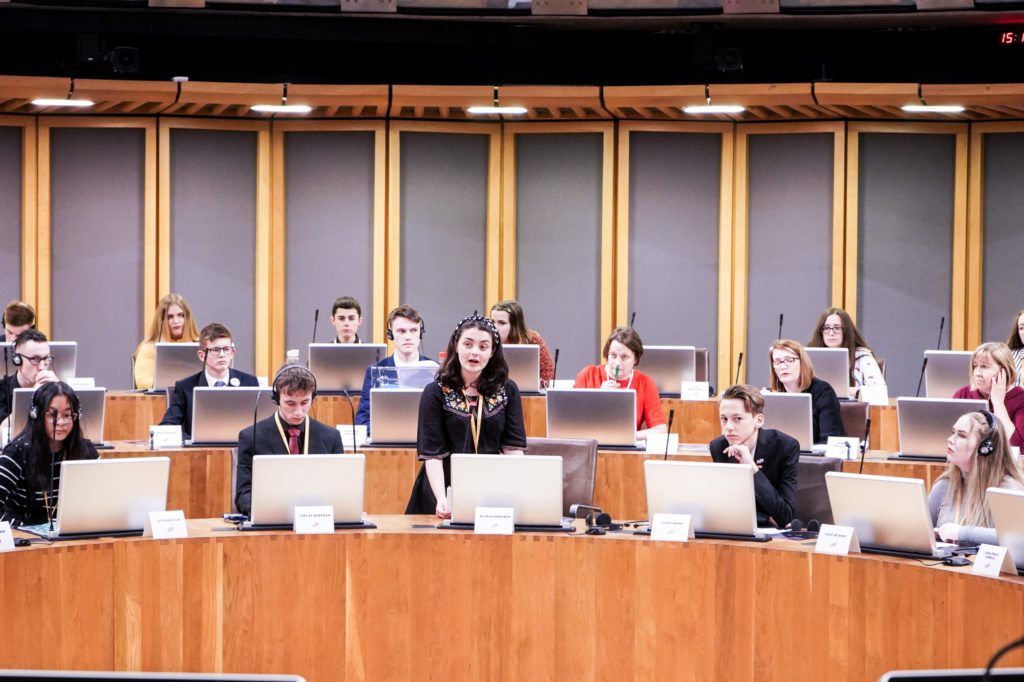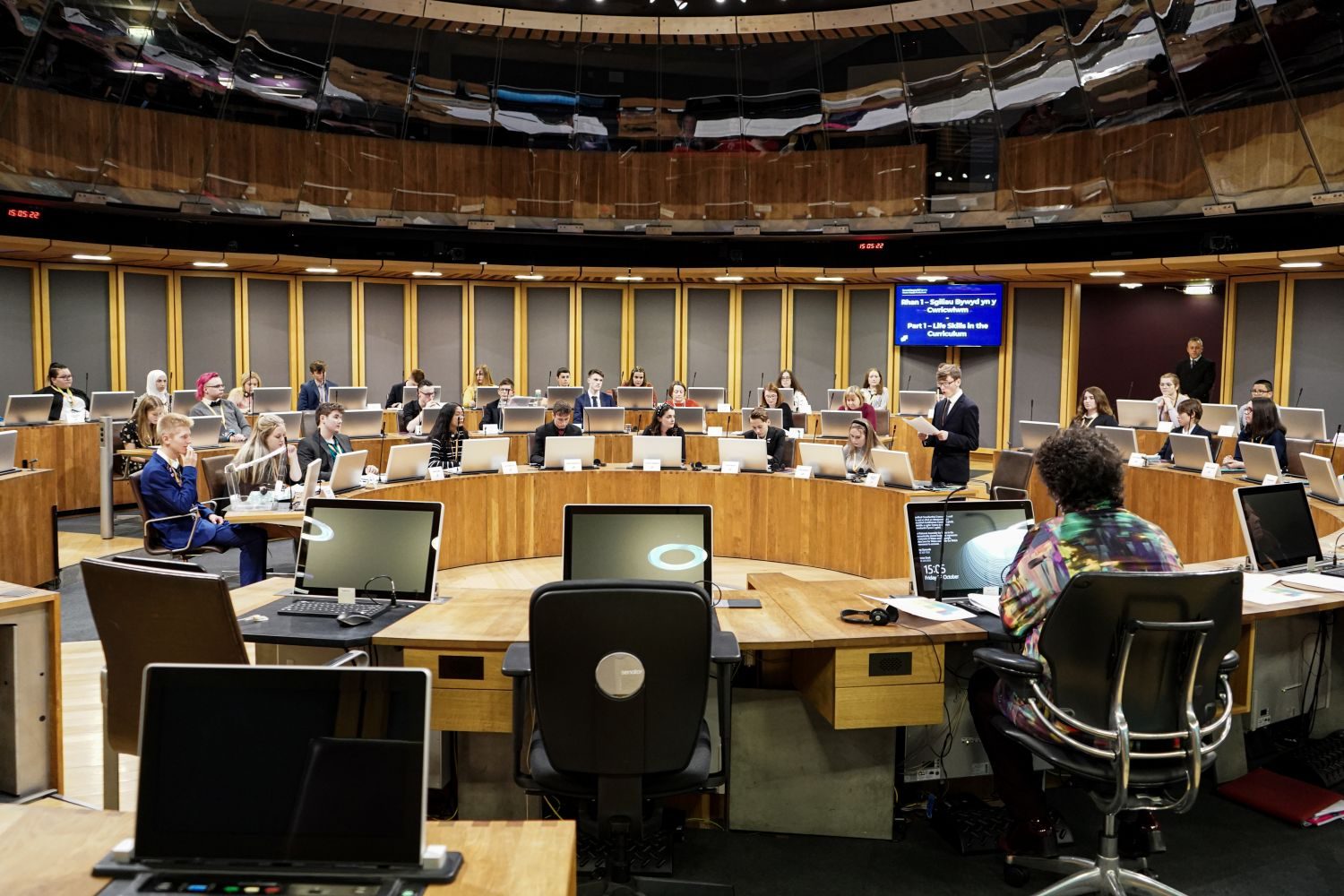Wales has seen a growth in activism among young people, especially ahead of next year’s elections where the voting age has been lowered to 16, what motivates them to be an active part of politics?

Ffion Griffith,15, has been a part of her school council since she was seven. Seeing other young people engage in social change and action motivated her, but it wasn’t until she became a Welsh Youth Parliament member, she was able to get actively involved in politics.
“As a young person, it is easy to feel like you have no voice, and that your opinion does not matter, and whilst this is never the case, having youth representation in politics is a sure way of showing young people that they can make changes to their future,” she says.
When she was elected as Islwyn’s Welsh Youth Parliament member in 2018 after the hard work she put into campaigning, she certainly felt excited and proud. But it was accompanied by the nervousness about being an effective connection between the young people in her area and the Parliament. “There is definitely a misconception that politics is only for older men in suits,” she adds.
In November 2019, National Assembly for Wales passed a new law to lower the voting age to 16, from the next Welsh Assembly Election in 2021. This became a part of the Senedd and Election (Wales) Act 2020. It came after 50 years since 1969 when the voting age was lowered across the UK from 21 to 18.
This concept is not new to Scotland where 16 and 17-year-olds have had the right to vote in local and Scottish elections in the 2014 referendum on Independence.
In a statement by the Welsh Parliament, the Llywydd (President) of the Senedd, Elin Jones, said that the change was “long overdue”. She added, “Votes at 16 will empower our young people to participate in the democratic process and give young people a stronger voice in the future of our nation.”
Another member of the Welsh Youth Parliament (WYP), Gwion Rhisiart, believes that lowering the voting age is instrumental in a healthy democracy. He says, “16-year-olds are affected so much by decisions made by the Welsh Government, such as mental health, wages and taxes. It’s only fair and reasonable that young people can have their say if they’re being affected by the Government.”
The WYP was set up in late 2018 by the National Assembly for Wales with the very aim to give young people across the country a voice. The first term is from November 2018 to November 2020.
It consists of 60 members (aged 11-18) to mirror the Assembly. Young people nominate themselves as candidates for election and campaign for their peers to vote for them. Of this, 40 constituency members are elected in this way. The remaining 20 members are elected by a diverse range of partner organisations to represent BAME young people, the LGBT+ community, carers, deaf students, and more.
“The Welsh Youth Parliament is for young people, by young people, with young people,” states a staff member.
In an interview with Positive.news, Delyth Lewis, the WYP’s manager, said that the main purpose of the assembly is to give young people a voice on the topics that matter to them. She added, “It’s also for them to understand how politics works, and for young members to act as ambassadors for their school, community, and friends.”
If young people participate in the political landscape from a young age, they will become more engaged citizens as they grow older, believes Eve Davies, 15, a member of the Welsh Youth Parliament from Blaenau Gwent.
It’s also necessary that young people feel there are people they can relate to in political positions so that they are inspired to take an interest in politics.”
Eve davies
Talking about the importance of such an institution, she adds, “Young people could provide a fresh perspective that adult representatives haven’t yet considered, so, in my opinion, it’s of paramount importance.”
The Welsh Youth Parliament’s motto ‘Your Choice, Your Voice, Your Future’ is not only true for the members but for young people across Wales too, according to Ffion Griffith.
During the first residential in February 2019, Welsh Youth Parliament Members chose to focus on three topics. These are: Emotional & Mental Health Support, Littering & Plastic Waste, and Life Skills in the Curriculum.
The 15-year old member, Gwion Rhisiart, who represents Cardiff Central in South Wales Gwion, shared that he is currently the part of a committee, Life Skills in the Curriculum, which is discussing the response from the Minister for Education to the WYP report published in October 2019.
The report contained 13 recommendations for the new Welsh Curriculum; which is being taught from September 2022 onwards. In addition to this, the committee has also been discussing how they can promote votes at 16, before the next Senedd Cymru election in 2021.
They have been looking at the most effective and clear ways to distribute information to young people on the election and how the Senedd works. According to a research done by Beaufort in 2020, even after lowering the voting age to 16 for next year’s Senedd election, it was found that young people in Wales have a ‘very limited’ understanding of Welsh Politics.
Researchers who were commissioned by the Welsh Government to explore the knowledge of participants from 14 to 17-year-olds found that there was a lot of confusion when it comes to politics. Many participants assumed that the Welsh Government was the same entity as the National Assembly for Wales. According to the researchers, there was also confusion over how the Welsh Government and National Assembly for Wales were related to the UK Government.
“We as a Welsh Youth Parliament are very eager to increase young people’s understanding of Welsh politics, particularly in light of the lack of understanding of devolution during the coronavirus pandemic,” says Ffion Griffith.

According to Gwion, the WYP has considered videos, pamphlets, and leaflets, and will also be working closely with the Senedd Commission to ensure that young people will be going to the polls knowing how they’re represented.
As a member of the Emotional and Mental Health and Support committee, Ffion Griffith, shared that it has given her the opportunity to work closely on bettering mental health and support provision in Wales, focusing on preventative care, training, stigma, and communication. Despite not being able to run their regional event in July due to the coronavirus, the survey has been released for both young people aged 11-25 and parents/guardians/teachers/carers.
The third committee, the Littering and Plastic Waste Committee have created a Reduce, Reuse, Recycle questionnaire as part of their campaign against plastic waste, according to Gwion Rhisiart. They are asking young people to fill in the questionnaire so they can collect data which will shape their campaign later this year.
“In September of 2019, we were asked to feedback to the Senedd’s Culture, Welsh Language and Communications Committee about promoting Welsh culture and language,” shares Ffion Griffith. They discussed including Welsh politics as a mandatory part of the curriculum, particularly with 16 and 17-year-olds voting in the next Senedd elections and were eager for it to be integrated with other subjects, such as history, or even Welsh language.
On 26th June 2019, a joint session was held between the Welsh Youth Parliament and Senedd Cymru to ratify their declaration of working together to ensure the voices of young people are heard and listened to.
“The joint sessions show firsthand to young people across Wales that our members of the Senedd are listening to the views of the Welsh Youth Parliament and young people that we have worked with.
“There is a tendency to believe that young people’s views are not taken seriously or are forgotten about, however, these sessions prove to people across Wales that young people are at the centre of all decisions made for their future,” says Ffion Griffith
According to an article by Positive.news, the WYP has its limitations. Even though the Assembly Members are committed to listening to the members, but it does not have any powers in law. Delyth Lewis, the WYP’s manager, in the same article said, “The challenge is to get the right balance between pushing boundaries, a lot of young people want to change the world, which is amazing,” she added. “But it’s about making sure we’re realistic in what we can achieve in the two years.”
At the present time of crisis, due to COVID-19, the WYP also had to adjust to a new way of work. “We are hosting meetings with our members on Microsoft Teams, both as regions to keep them updated on the current situation and what it means for the youth parliament, and as committees so that the members can progress their work programme digitally,” says a staff member.
They are also looking at hosting their regional events online as creative webinars to engage with young people on the topics of Emotional & Mental Health Support and Littering & Plastic Waste.
One of the biggest challenges that they will now face is ensuring they can carry on our work to the same standard during this pandemic, Gwion Rhisiart believes. “We want to be able to improve the lives of young people of Wales, and I do think that one of the challenges we’ll face is continuing to connect with young people as much as we would’ve before the pandemic,” he says.
